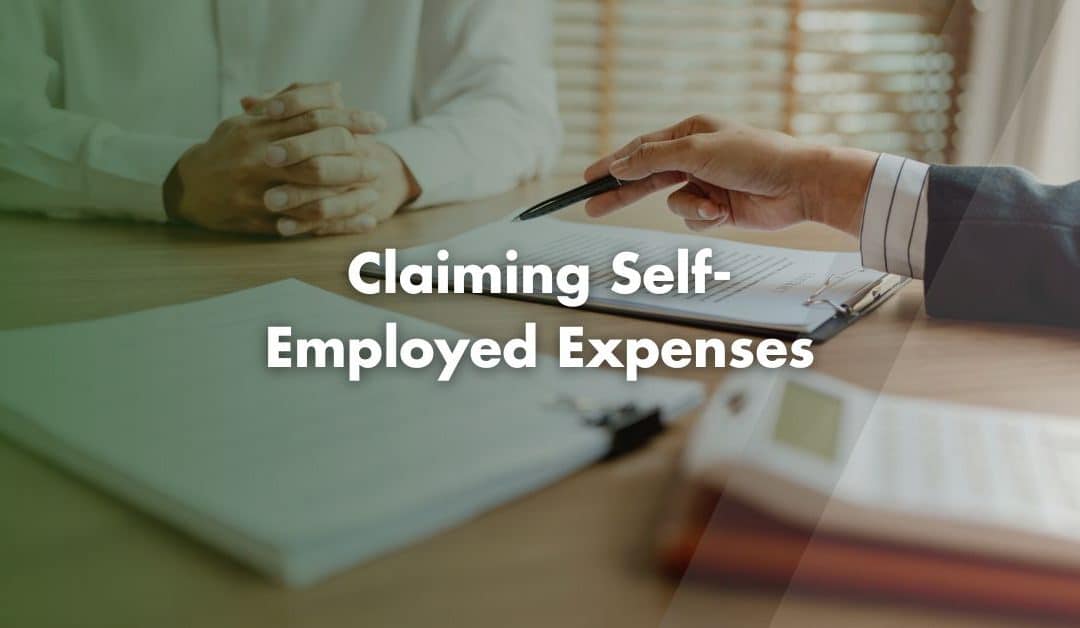Your business exclusively incurs self-employed expenses. You deduct these expenses from your income to calculate your taxable profit. Expenses must be “Wholly and Exclusively” for your business. You cannot claim personal expenses, such as personal shopping or holidays.
For example: If you earn £50,000 and claim £10,000 in allowable expenses, you will pay tax on £40,000, not the full £50,000.
Types of Allowable Self-Employed Expenses
1. Office and Property Costs
- Office Costs – Stationary, phone bills, internet, printing and software used for less than 2 years.
- Home Office Costs – A proportion of your rent, mortgage interest, utility bills and Council Tax can be claimed. (Use of Home Allowance)
- Business Premises – Rent, utility bills and property insurance. You cannot claim the cost of purchasing property but can deduct repair and maintenance costs.
2. Travel and Vehicle Costs
- Travel Costs – Train, bus and airfares for business trips. Hotel stays and meals on overnight trips are also deductible.
- Vehicle Costs – Fuel, repairs, servicing, insurance, parking and breakdown cover. If you use your vehicle for both personal and business purposes, only claim the business-related portion.
- Simplified Expenses – Sole traders can claim a Flat Rate for mileage instead of calculating actual costs. (See below)
3. Marketing and Advertising
- Allowable Costs – Advertising in newspapers, online marketing, website development, printing business cards and promotional materials.
- Non-Allowable Costs – Business-related client entertainment is not tax-deductible.
4. Staff Costs
- Salaries, bonuses, pensions and training costs for employees.
- Subcontractor payments and Employers’ National Insurance Contributions.
- Entertainment for employees, such as Christmas parties, are allowable if it is open to all staff and costs less than £150 per person per year.
- Gifts for employees must be of low value and not cash or vouchers, such as Christmas presents under £50.
5. Equipment and Supplies
- Day-to-day items such as stationery, printer ink and postage.
- Larger items such as computers, machinery or furniture are claimed as Capital Allowances if used over multiple years.
6. Professional Fees and Insurance
- Accountant, solicitor and surveyor fees related to your business.
- Business insurance premiums, such as Public Liability or Professional Indemnity insurance.
Keeping Records of Your Claims
You should keep receipts, invoices and bank statements that prove your business costs. You should also organise your expenses into categories such as Travel, Office Costs and Marketing.
While you do not need to submit these when filing your tax return, HMRC may ask to see them if they review your accounts. You must keep these records for at least 5 years after the 31st January submission deadline for the relevant tax year.
Simplified Expenses
Simplified Expenses offer a Flat Rate method for claiming certain costs. This includes mileage rates for vehicles and set amounts for working from home.
HMRC mileage rates are 45p per mile for the first 10,000 miles in a tax year and 25p per mile after that. However, once you use the mileage method for a vehicle, you must continue using it for that vehicle.
Flat-rate home working applies only if you work 25 hours or more per month from home and does not include phone or internet, which you must claim separately.
Claiming Home Office Expenses
If you work from home, you can claim part of your utility bills, rent or mortgage interest. The simplest way to calculate this is to divide your costs by the number of rooms used for business and the amount of time you work from home.
Use either the simplified flat-rate method or the actual-cost method by dividing your costs based on business use. Remember to exclude any private-use proportion and claim phone/internet separately.
Contact Us
We are not just accountants; we are Chartered Accountants with one of the most reputable and premium accounting bodies. We are registered and regulated by ACCA; so you can rest assured that you are in good hands. Knowing this, don’t hesitate to get in touch with us if you require assistance: Pi Accountancy | Contact Us
This article is for general informational purposes only and does not constitute legal or financial advice. While we aim to keep our content up to date and accurate, UK tax laws and regulations are subject to change. Please speak to an accountant or tax professional for advice tailored to your individual circumstances. Pi Accountancy accepts no responsibility for any issues arising from reliance on the information provided.

